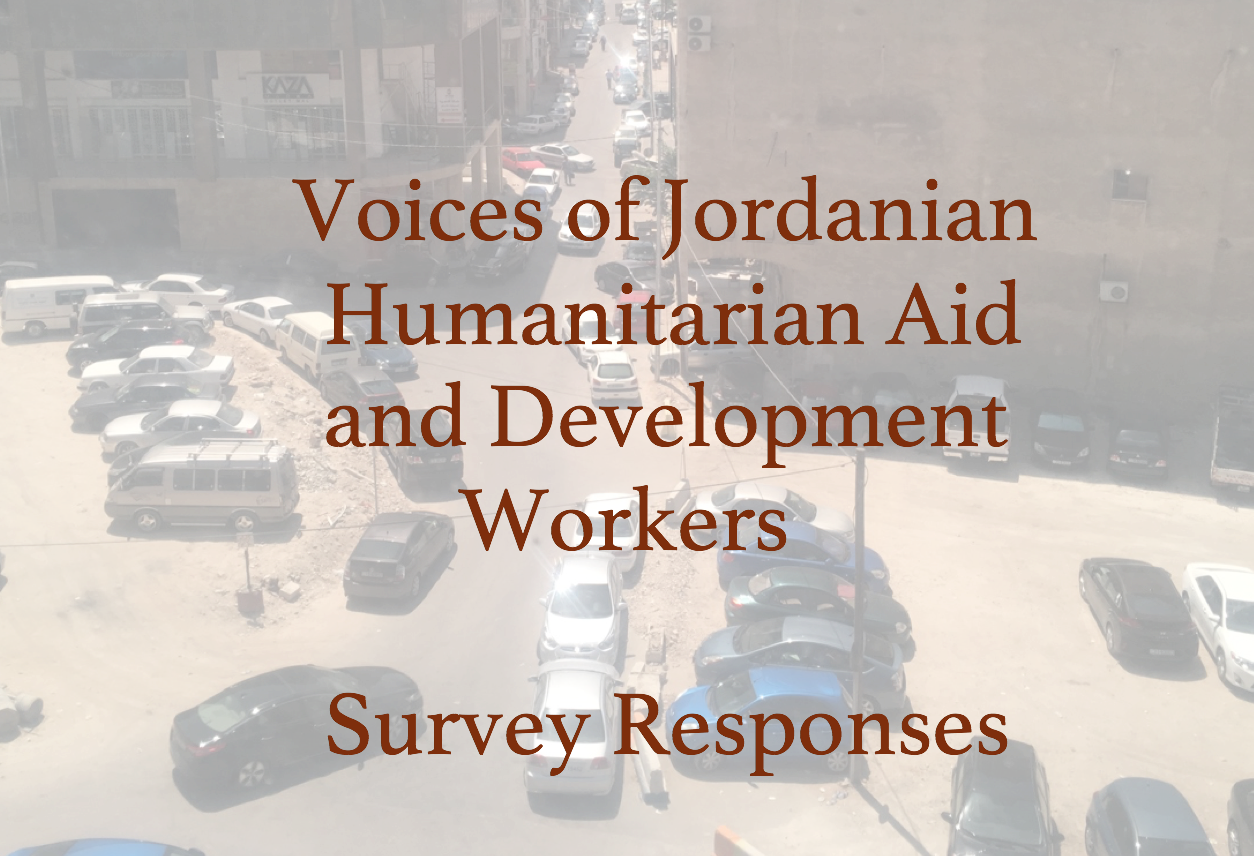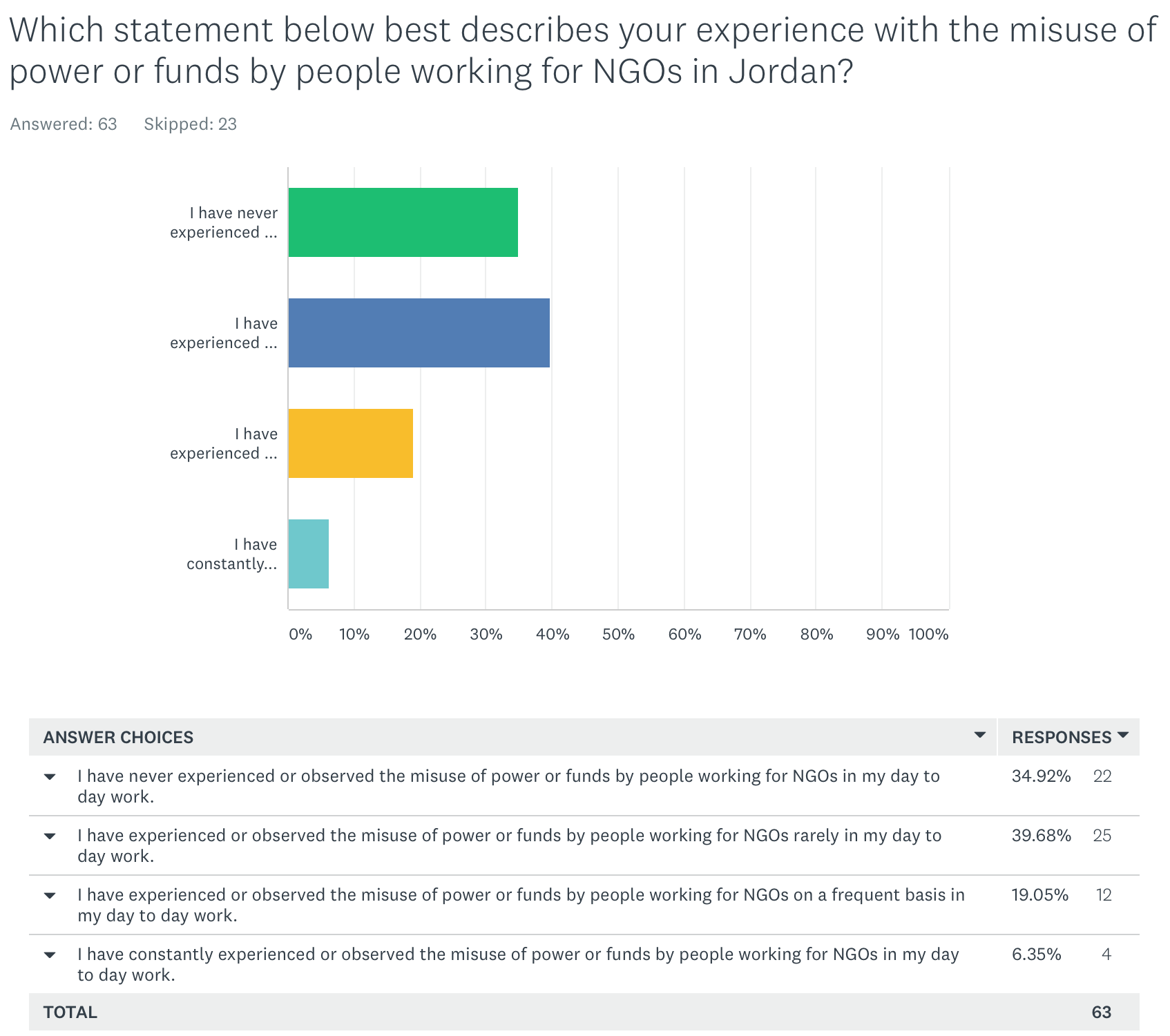Misuse of funds or power
More results from the Jordanian humanitarian worker survey.
Definitions
According to Transparency International, “Corruption is the abuse of entrusted power for private gain.” Their definition, though, goes on to infer a more narrow focus on money. “It can be classified as grand, petty and political, depending on the amounts of money lost and the sector where it occurs.” Working since the mid 1990’s, Transparency International  has ranked the level of corruption within nations based on a complex set of indicators. The 2017 list had New Zealand at the top and Somalia very last, with Jordan in the mid-pack at 59 (my home, the US, was 16th) . Though the bottom half of the list does contain mostly ‘Global South’ nations, any sober analysis has to emphasize that corruption is most demonstratively a “first world” problem as well. Like I said, my home nation is the US. Enough said.
has ranked the level of corruption within nations based on a complex set of indicators. The 2017 list had New Zealand at the top and Somalia very last, with Jordan in the mid-pack at 59 (my home, the US, was 16th) . Though the bottom half of the list does contain mostly ‘Global South’ nations, any sober analysis has to emphasize that corruption is most demonstratively a “first world” problem as well. Like I said, my home nation is the US. Enough said.
If we embrace a broad view of the phrase “private gain” then we must include a whole host of behaviors, and this must include the #MeToo and #AidToo issues. Parsing out what “entrusted power’ means is important as well, but that may be for another post.
In this post from a few years ago I pose the question “The cancer of corruption or the culture of corruption?” and present many voices from aid workers around the world who eloquently explore the many nuances involved in defining, understanding, and dealing with corruption.
Words matter
One of the more robust discussions I had with Jordanian humanitarians as we were crafting the survey had to do with the question related to misuse of power. I first proposed the exact wording I had used in the survey of Filipino humanitarian workers. “Which statement below best describes how you feel about corruption related to your job?”
below best describes how you feel about corruption related to your job?”
- I have to deal with corruption very rarely in my day to day work.
- I have to deal with corruption frequently in my day to day work.
- I have to deal with corruption on a constant basis in my day to day work.
- I never have to deal with corruption in my day to day work.
Although the word ‘corruption’ translates pretty much exactly (الفساد), the wisdom was this had more political, big business kinds of associations rather than the more general “misuse of power.” In the end, the word ‘corruption’ was deemed too vague, and we arrived at an alternate phrasing. “Which statement below best describes your experience with the misuse of power or funds by people working for NGOs in Jordan?”
Here are the data  which indicate that 25% -one quarter- of the respondents ‘experienced the misuse of power or funds’ on a ‘frequent’ or ‘constant’ basis.
which indicate that 25% -one quarter- of the respondents ‘experienced the misuse of power or funds’ on a ‘frequent’ or ‘constant’ basis.
Is that a lot?
No way to tell, but of all the questions on the survey, this one begs for narrative explanation. Only 6 respondents offered their thoughts, and some indicate areas where more and probing research would be useful.
Jordanians speak
One respondent said simply, “Not funds just power.” Another helped shed light on the broad range of behaviors that can be viewed as misuse of power by any and all staff.
“Breaches of the code of conduct, bullying, conflict of interest, etc etc… among both national and international staff, in different dimensions but somewhat equally.”
In previous posts I have talked about the tension between ‘national’ and ‘international’ staff, and these two comments underscore this situation, with the second one below giving several provocative examples of ‘misuse of power.’
“Particularly by foreigners.”
“I think the outrageous benefits some staff — some incomptent — receive is a perfect example of misuse of funds. The fact that decisions are made all the time without consulting constituents is also misuse of power and funds. Strategms of “silencing” are always practiced intentionally or not. One very prominent example of how the sector reports ‘beneficiary reach.’ A beneficiary could have attended only one or two sessions of a 20 sessions program and they would be reported as ‘reach’ to justify the hemmoraging of funds. One very troubling example is the very lax regulations governing cross-borders programs. There are a lot of whispers about funds going to the ‘wrong hands’ there because of the lack of accountability and follow up.”
In one of my interviews with a Jordanian female humanitarian worker we talked in detail about the issue of ‘creative accounting’ with beneficiary reach. This is a gray area where use of power might as easily be described both as benign and benevolent or malignant and nefarious, depending upon one’s perspective and the complex array of contextual variables that are in play.
This situation reminds me of one what one international aid worker argued in the Aid Worker Voices survey: “One man’s corruption is another man’s wealth redistribution system. I find it hard to judge others on this.”
Back to the numbers
Looking at the data I must wonder how the 35% of the respondents who indicated ‘never’ and the 40% of the respondents who checked that they ‘rarely’ experienced the misuse of power or funds interpreted the question and the response choices. Misuse of power -or at least the appearance of same- is, I think, a given in an industry populated by imperfect humans. And to be clear, that means every industry, not just the humanitarian sector, has misuse of power; it’s a matter of degree and definition, but it is there.
Methodology note
As I read and talk to others about the humanitarian aid sector I find that the concept ‘unit of analysis’ is sometimes lost on or glossed over by many. As I reflect on the above post about ‘corruption’ the realization that I -and because of my question design, my respondents- have further contributed to this confusion. When talking about ‘misuse of power’, this question should arise, to wit, “what is the unit of analysis being talked about: the individual, the organization, or the ‘sector’ in general?” In the long comment above the respondent refers to ‘the sector’, as in her statement “One very prominent example of how the sector reports ‘beneficiary reach. (emphasis added)” It is never possible to know exactly what is in a person’s mind when they write (or speak), but I will presume the following. It may be the organization’s policy to report ‘beneficiary reach’ in a way that seems disingenuous -i.e., ‘misuse of power’- but the individual humanitarians who follow this policy are only doing their job following the letter of the policy, perhaps disagreeing with the policy privately. Although the question wording clearly states “Which statement below best describes your experience with the misuse of power or funds by people working for NGOs in Jordan?” it is at least questionable that all respondents, including the woman who that response, conflated the units of analysis.
The issue of unclear statement and/or interpretation of unit of analysis is common in the social sciences, and for that matter in much discourse about the humanitarian aid sector. Inappropriate behavior (‘misuse of power’) by an individual -or an organization-must be called out, but those doing the calling out need be careful to be clear about the entity who is the culprit.
In the case of the Haiti/OXFAM issue, we see that it was individuals, not the whole organization that was primarily at fault. That said, the loss of social capital by an organization due to actions by individuals can and does happen, and this can go both ways. An individual may suffer loss of social capital simply because of the actions of her/his organization. And, yes, it can be that both the organization and the individual are misusing power, and also that in real life this is rarely a clean binary. But that does not negate the importance of appreciating the distinction in the first place.
As always, contact me if you have any feedback, thoughts, or good hummus recipes.


 Follow
Follow